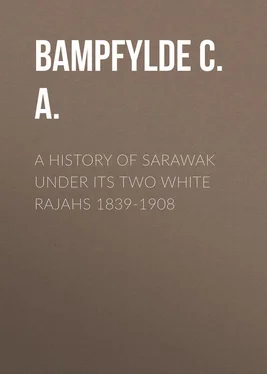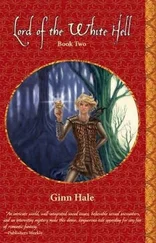C. Bampfylde - A History of Sarawak under Its Two White Rajahs 1839-1908
Здесь есть возможность читать онлайн «C. Bampfylde - A History of Sarawak under Its Two White Rajahs 1839-1908» — ознакомительный отрывок электронной книги совершенно бесплатно, а после прочтения отрывка купить полную версию. В некоторых случаях можно слушать аудио, скачать через торрент в формате fb2 и присутствует краткое содержание. ISBN: , Жанр: foreign_antique, foreign_prose, на английском языке. Описание произведения, (предисловие) а так же отзывы посетителей доступны на портале библиотеки ЛибКат.
- Название:A History of Sarawak under Its Two White Rajahs 1839-1908
- Автор:
- Жанр:
- Год:неизвестен
- ISBN:http://www.gutenberg.org/ebooks/52873
- Рейтинг книги:4 / 5. Голосов: 1
-
Избранное:Добавить в избранное
- Отзывы:
-
Ваша оценка:
- 80
- 1
- 2
- 3
- 4
- 5
A History of Sarawak under Its Two White Rajahs 1839-1908: краткое содержание, описание и аннотация
Предлагаем к чтению аннотацию, описание, краткое содержание или предисловие (зависит от того, что написал сам автор книги «A History of Sarawak under Its Two White Rajahs 1839-1908»). Если вы не нашли необходимую информацию о книге — напишите в комментариях, мы постараемся отыскать её.
A History of Sarawak under Its Two White Rajahs 1839-1908 — читать онлайн ознакомительный отрывок
Ниже представлен текст книги, разбитый по страницам. Система сохранения места последней прочитанной страницы, позволяет с удобством читать онлайн бесплатно книгу «A History of Sarawak under Its Two White Rajahs 1839-1908», без необходимости каждый раз заново искать на чём Вы остановились. Поставьте закладку, и сможете в любой момент перейти на страницу, на которой закончили чтение.
Интервал:
Закладка:
The Malay is the latest immigrant. He is of mixed breed, and the link that holds the Malays together is religion, for they are Mahomedans, whereas the Kayans, Land and Sea-Dayaks, and other tribes, are pagans. To accept their own traditions, the Bruni Malays came from Johore, whereas the Sarawak Malays, like those of the Malay peninsula, came direct from the ancient kingdom of Menangkabau. Between them there is a very marked difference in language, character, and appearance. Whence the proto-Malay stock came is a moot point, but it may be of Mongolian origin, subsequently blended with many other distinct ethnic types, such as the Arab and Hindu, and in the case of the Bornean Malay with the Indonesian peoples of their and the neighbouring islands. The Malays form the main population of Kuching, the capital, and of the towns Sadong, Simanggang, Kalaka, and Sibu. They have villages on the Lundu, Saribas, and lower Rejang, are scattered along the coast between Capes Datu and Sirik, and are to be found in the principal settlements beyond. The Malay has been very variously judged. The Malay Pangiran, or noble, was rapacious, cruel, and often cowardly. But he had a grace of manner, a courtesy, and hospitality that were pleasing as a varnish. The evil repute that the Malay has acquired has been due to his possession of power, and to his unscrupulous use of it to oppress the aboriginal races. But the Malay out of power is by no means an objectionable character. Sir James Brooke, the first Rajah, thus paints him: —
The feeling of the Malay fostered by education is acute, and his passions are roused if shame be put upon him; indeed the dread of shame amounts to a disease, and the evil is that it has taken a wrong direction, being more the dread of exposure or abuse, than shame or contrition for any offence. Like other Asiatics truth is a rare quality among them, and they have neither principle nor conscience when they have the means of oppressing an infidel.
They are thus depicted by Mr. Horace St. John in a work somewhat ambitiously entitled, The Indian Archipelago, its History and present State , vol. ii. p. 267 (published 1853).
Under the heading "Malays," we find the following: —
The Malays are Mahomedans, living under the rule of the Prophet's descendants, a mongrel race of tyrants, gamblers, opium-smokers, pirates, and chiefs, who divide their time between cockfighting, smoking, concubines, and collecting taxes.
That Mr. Horace St. John had never been in the Archipelago to which his history relates, was doubtless a matter of little consequence to many of his home-staying contemporaries. Sir Spenser St. John, brother to the author of the above-quoted Indian Archipelago, etc. , who certainly wrote from a long personal experience of the people and country, offers us in his Forests of the Far East an opinion on the character and conduct of the Malay from which every one who has lived amongst these people will find no important cause to differ. Sir Spenser writes: —
The Malays are faithful to their relatives and devotedly attached to their children. Remarkably free from crimes, and when they are committed they generally arise from jealousy. Brave when well led, they inspire confidence in their commanders; they are highly sensitive to dishonour, and tenacious as regards their conduct towards each other, and being remarkably polite in manner, they render agreeable all intercourse with them. Malays are generally accused of great idleness, and in some sense they deserve it; they do not like continuous work, but they do enough to support themselves and families in comfort, and real poverty is unknown among them.
The author here refers to the Malays of Sarawak.
Sir W. H. Treacher, 37 37 Late Resident-General of the Federated Malay States.
who knows the Malay intimately, paints him in favourable colours, now that he is restrained from tyrannising over the weak. He says: —
I am frequently asked if treachery is not one of their characteristics, and I unhesitatingly answer No . This particular misconception was probably initiated by the original merchant-adventurers, and we can imagine what a reception a body of strange, uninvited, white infidels would receive at the hands of Mahomedan Malays, whose system of warfare, taking its rise from the nature of the thickly jungle-covered country they inhabit, is adapted more for ambuscade than for fighting at close quarters. Add to that, being Mahomedans, they were by their religion justified in indulging in piracy and murder where the victims were infidels. The Malay is possessed of at least as much passive courage as the average Englishman, and is probably less troubled by the fear of death and the hereafter than many Christians.
On the other hand I must admit that the Malay, owing to his environment – the balmy climate making no severe calls upon him in the matters either of food, artificial warmth, or clothing, has not the bustling energy of the white man, nor the greed for amassing wealth of the Chinaman, nor does he believe in putting forth unnecessary energy for a problematical gain; he is like the English tramp who was always willing – that is, to look on at other people working, or like that one who complained that he was an unfortunate medium, too light for heavy work, and too heavy for light work.
The natural savagery of the Malay continually threatens to break out, and not infrequently does so in the form of the amok (running amuck), the national Malay method of committing suicide.
Apart from this tendency, when under control the Malay character has much in common with the Mongol, being, under ordinary circumstances, gentle, peaceable, obedient, and loyal, but at the same time proud and sensitive, and with strangers suspicious and reserved.
The Malays can be faithful and trustworthy, and they are active and clever. Serious crime among them is not common now, nor is thieving. They have a bad propensity of running into debt, and obtaining advances under engagements which they never fulfil. They make good servants and valuable policemen. All the Government steamers are officered and manned throughout by Malays, and none could desire to have better crews. They are the principal fishermen and woodsmen. Morality is perhaps not a strong point with them, but drinking is exceptional, and gambling is not as prevalent as it was, nor do they indulge in opium smoking.
With regard to the Chinaman, it will be well to let the present Rajah speak from his own experience. He says that —
John Chinaman as a race are an excellent set of fellows, and a poor show would these Eastern countries make without their energetic presence. They combine many good, many dangerous, and it must be admitted, many bad qualities. They are given to be overbearing and insolent (unless severely kept down) nearly to as great a degree as Europeans of the rougher classes. They will cheat their neighbours and resort to all manner of deception on principle . But their redeeming qualities are comparative charitableness and liberality; a fondness for improvements; and, except in small mercantile affairs or minor trading transactions, they are honest.
They, in a few words, possess the wherewithal to be good fellows, and are more fit to be compared to Europeans than any other race of Easterns.
They have been excluded as much as possible from gaining a footing in Batavia, 38 38 This was written in 1866.
under the plea of their dangerous and usurious pursuits; but the probability is that they would have raised an unpleasant antagonism in the question of competition in that country. The Chinaman would be equal to the Master, or White Man, if both worked fairly by the sweat of his brow. As for their usury, it is not of so dangerous a character as that which prevails among the Javanese and the natives.
Интервал:
Закладка:
Похожие книги на «A History of Sarawak under Its Two White Rajahs 1839-1908»
Представляем Вашему вниманию похожие книги на «A History of Sarawak under Its Two White Rajahs 1839-1908» списком для выбора. Мы отобрали схожую по названию и смыслу литературу в надежде предоставить читателям больше вариантов отыскать новые, интересные, ещё непрочитанные произведения.
Обсуждение, отзывы о книге «A History of Sarawak under Its Two White Rajahs 1839-1908» и просто собственные мнения читателей. Оставьте ваши комментарии, напишите, что Вы думаете о произведении, его смысле или главных героях. Укажите что конкретно понравилось, а что нет, и почему Вы так считаете.












